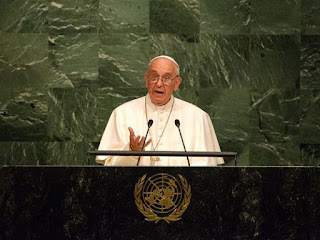Pope Francis declared to more
than 100 world leaders and diplomats at the United Nations in late September
2015 that a "right of the environment" exists and that our species
has no authority to abuse it or render it unfit for human habitation.[1] In stressing that urgent action is needed to
halt the destruction of God's creation, he made explicit reference to a
religious basis for his moral claim. He said the universe is the result of a
"loving decision by the creator, who permits man respectfully to use
creation for the good of his fellow men and for the glory of the creator: He is
not authorized to abuse it, much less destroy it."[2]
This statement may overplay both the religious nature of the basis and the
destruction. I turn now to parsing the statement in three parts, after which I
will supply the basis of the pope’s religious rationale, which is narrower than
he suggested in his speech.
The complete essay is at “Pope
Francis at the U.N. on Climate Change.”
Pope Francis addressing the United Nations' General Assembly. (Bryan Thomas/Getty)
[1]
Nicole Winfield and Jennifer Peltz, “Pope
Beseeches World Leaders to Protect the Environment,” Associated Press,
September 25, 2015.
[2] Ibid.



